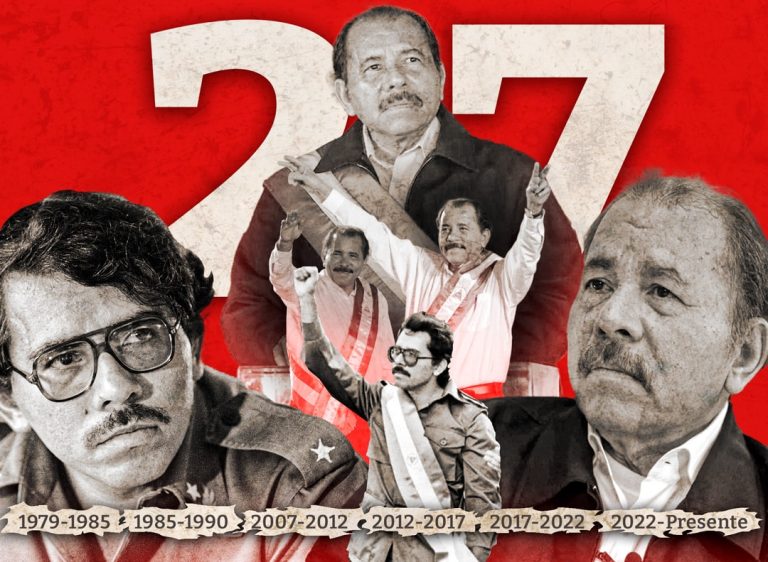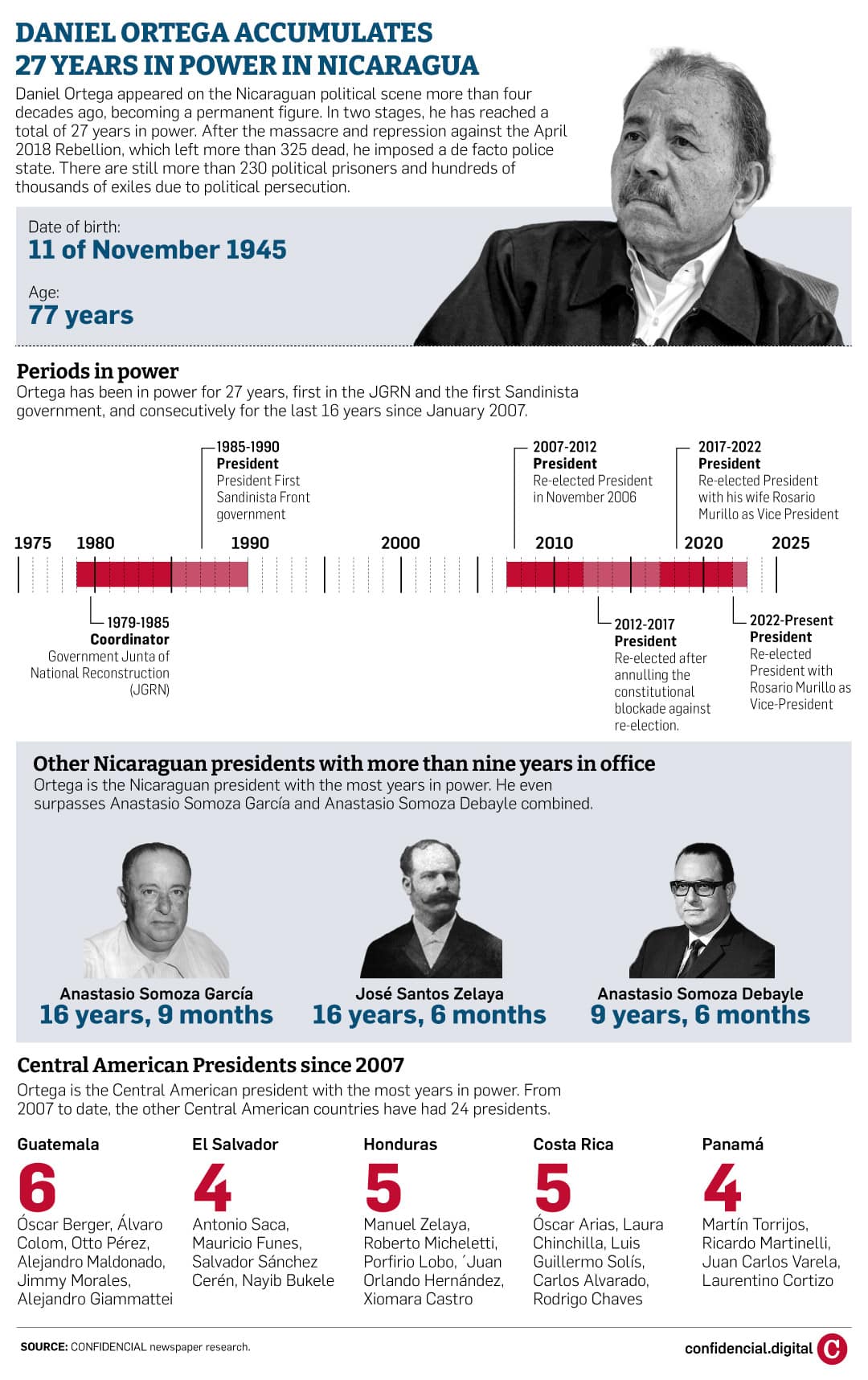11 de enero 2023

Children of Exile: The Births “Sowing Hope” in the Camp of Nicaraguan Farmers

PUBLICIDAD 1M
PUBLICIDAD 4D
PUBLICIDAD 5D
In his 16 consecutive years in power and a total of 27 in two different stages, Ortega violates 29 human rights and all public liberties.

Daniel Ortega, born in November 1945, appeared on the Nicaraguan political scene more than four decades ago as one of the leaders of the Sandinista National Liberation Front (FSLN), and became a permanent figure in the country's history. Since 1979, when he assumed the coordination of the Government Junta of National Reconstruction after the triumph of the revolution against the Somoza dictatorship, Ortega has been a constant face for Nicaraguans, among them the 4.5 million under 43 years of age (almost 70% of the national population) who had not been born by then.
During these more than forty years, the eternal caudillo of the FSLN accumulated 27 years in power, in two different stages. The first was during the decade of the eighties, and the second since January 2007, when he returned to the Presidency and has remained there by annulling not only constitutional regulations against reelection but also by eliminating any trace of political competition. After the massacre and repression against the “April 2018 Rebellion”, which left more than 325 dead, Ortega imposed a de facto police state. There are currently more than 230 political prisoners and hundreds of thousands of exiles due to the political persecution of his operators and sympathizers.
Ortega has become the longest serving president in Nicaraguan history, surpassing even dictators Anastasio Somoza García and Anastasio Somoza Debayle combined. He is also the main annihilator of human rights and public freedoms of Nicaraguans.
CONFIDENCIAL analyzed each of the rights violated by Ortega, who has become self-isolated from the democratic community, and is not recognized internationally except by other regimes like his in Cuba and Venezuela, and equally internationally condemned allies such as Russia and China.
After 27 years in power, of which the last sixteen have been consecutive – and which is now combined with the power of his wife, vice president and spokeswoman, Rosario Murillo-- Ortega is actively violating at least 29 of the thirty rights and freedoms recognized in the section of the country's Political Constitution entitled "Rights, duties and guarantees of the Nicaraguan people". These rights are also enshrined in the Universal Declaration of Human Rights.
 The right to be Nicaraguan
The right to be Nicaraguan"Juan" has an expired passport and that is the only thing that accredits him as a Nicaraguan in the United States. He tried to renew the document in Nicaragua, but after encountering several obstacles he got an alert: he could be imprisoned again for his link to the citizen protests of 2018. He decided to leave the country. "In Nicaragua they denied me my passport," he recounts now from exile.
"You need an identity, something to show who you are," he says anxiously, because without a valid document access to other services in a country that is not his own is more difficult. The story of "Juan" is repeated with requests in Nicaragua for identity cards, exit permits for minors and other personal documents, which are rights converted by the Ortega dictatorship into instruments of punishment and control against political prisoners, relatives of opponents, religious workers, students, or any citizen whom the Ortega regime places on its "red list", including its own sympathizers, public servants and family members.
This is the most recent of the rights violated by the dictatorship of Daniel Ortega and Rosario Murillo, in a situation that continues to worsen since 2018. Five months after the social outbreak of the April Rebellion, CONFIDENTIAL listed 18 human rights violated by Ortega, and that number has now grown to 29.
The systematic violation of human rights is typical of a tyrannical regime that represses any right it considers a danger to its "absolutist and single-party" pretensions, says lawyer Gonzalo Carrión, member of the Nicaragua Never Again Human Rights Collective and exiled in Costa Rica. Referring to the Universal Declaration of Human Rights and the guarantees recognized in the Political Constitution, Carrión believes that it is "unlikely" that any article remains "unscathed".
Ortega remains in power by blood and fire, after the cry for freedom, justice and democracy raised in 2018.
As in the case of "Juan”, the lives of hundreds of thousands of Nicaraguans have changed since that year. Juan did not want to leave Nicaragua. He tried to renew his passport to apply for an exit visa for his children in February 2022, but as he faced delays in the delivery of the document, he sensed a threat of imprisonment and went into exile. He left a power of attorney to continue the process, but after months of waiting, the answer is the same: "It is not ready".
The repression of immigration processes, denial of documents, tax extortion, administrative reprisals against companies, social benefits and public services is part of the political violence and human rights violations of the Ortega dictatorship in Nicaragua.
Olga Valle, researcher of the citizen-based electoral and political observation organization, Urnas Abiertas, points out that the country is experiencing a "totalitarian escalation" as a result of the perpetuation of Daniel Ortega in power by electoral fraud in 2021, when he was reelected together with his wife Rosario Murillo after imprisoning seven presidential pre-candidates and annulling the opposition political parties. "They are not leaving any single space for the citizenry to exercise their rights or enjoy fundamental freedoms," Valle denounces.
With the denial of identity and travel documents, the dictatorship violates Article 31 of the individual rights contemplated in the Political Constitution, which guarantees Nicaraguans to circulate, enter and leave the country freely. Since 2020, and taking advantage of public health requirements as part of Covid-19 protocols, immigration authorities have prevented dozens of Nicaraguans from entering or leaving the country, and have even confiscated their passports.
The Orteguista dictatorship violates fifteen other individual rights, including include the right to life, following the murder of more than 325 Nicaraguans between April and September 2018; the rights to liberty and the inviolability of the home, with arbitrary detention and the imprisonment of more than a thousand political prisoners, of whom more than 230 are still in prison or under "house arrest". In addition, the rights to equality before the law, to due process, judicial protection and respect for physical, psychological and moral integrity are being violated.
Participating in a march or joining a political party in Nicaragua means exposing oneself to arbitrary arrests, siege and persecution. In September 2018, the Orteguista regime banned all citizen expression --which four years later now even includes religious processions-- and empowered the Police to decide who could be on the street. Official activities are given green light, and any other Nicaraguan receives a beating and jail.
In the last quarter of 2020, the regime it passed new laws to fabricate cases against opposition leaders, journalists and activists, confining them to jails with sentences ranging from seven to thirteen years in prison. It has also dismantled organized civil society, through the cancellation of legal status to more than 3,000 non-profit and non-governmental organizations since 2018 to date, violating the political right to constitute organizations, established in Article 49 of the Political Constitution.
The worsening trend of violations of the rights of Nicaraguans has been denounced by the Inter-American Commission on Human Rights (IACHR), the Office of the High Commissioner for Human Rights and other international instances. Social rights are also on the list of violations.
In 2018, victims of state repression were not attended to in public hospitals. Two years later, with the Covid-19 pandemic, epidemiologists and health personnel questioned the handling of the health emergency that left tens of thousands dead, although the regime only recognizes 245.
Ex-political prisoners and their families have also denounced that public health services discriminate against them for political reasons, and in some cases have denied them health care, despite the fact that article 59 of the social rights section of the Political Constitution indicates that "All Nicaraguans have equal right to health".
Ortega has also failed to respect people's right to information, freedom of press and expression. Since Daniel Ortega's return to power, more than 50 media outlets have been closed in Nicaragua. In addition, the editorial offices of CONFIDENCIAL, La Prensa and the television channel 100% Noticias have been confiscated. They have also persecuted journalists and criminalized the profession, causing reporters and media personnel to go into exile.
Article 86 of the Constitution states that all Nicaraguans have the right to freely choose and exercise their profession or trade with no other requirements than an academic degree, but Daniel Ortega's dictatorship has imposed political affiliation, accredited with a Sandinista Front card, over academic preparation for a person to access a position in any government institution.
State workers, obligated to participate in party activities even outside working hours, have denounced the political surveillance in the institutions, which has extended to their relatives as well.
An unprecedented exodus
The systematic repression of the Ortega-Murillo dictatorship has provoked an "exodus" of Nicaraguans never seen before, not even in times of war, warns Gonzalo Carrión. In a Nicaragua with "the worst human rights scenario imaginable", the family unit, which the regime proclaims to care for in official propaganda, is the most damaged.
Carrión points out that forced displacement prevails with "heartbreaking connotations of a human tragedy". There are tens of thousands of families who suffer the uncertainty of losing their husband, wife, son, daughter, brother, during the journey to the United States. They expose themselves to kidnapping, rape, extortion and death, in search of safety or better opportunities.
Between 2018 and 2022, more than 600,000 Nicaraguans have left the country, more than half of them during 2022, mainly to the United States and Costa Rica, according to calculations by political scientist and researcher Manuel Orozco. This is a level of exodus never seen before in Nicaragua.
This article was originally published in Spanish in Confidencial and translated by our staff.
PUBLICIDAD 3M
Confidencial es un diario digital nicaragüense, de formato multimedia, fundado por Carlos F. Chamorro en junio de 1996. Inició como un semanario impreso y hoy es un medio de referencia regional con información, análisis, entrevistas, perfiles, reportajes e investigaciones sobre Nicaragua, informando desde el exilio por la persecución política de la dictadura de Daniel Ortega y Rosario Murillo.
PUBLICIDAD 3D